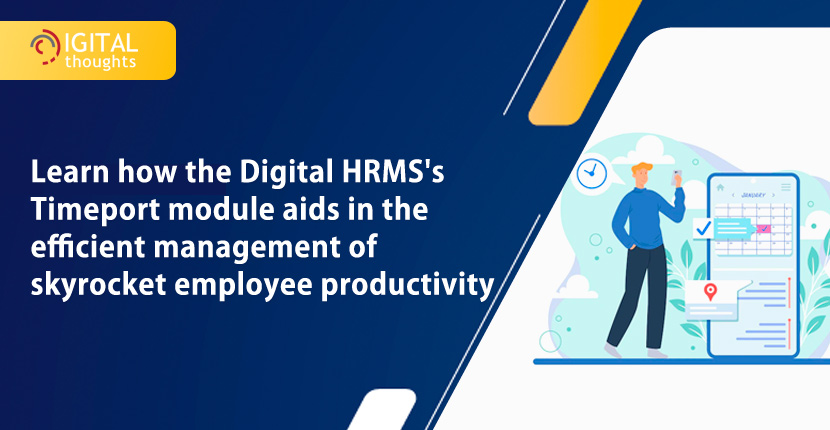How Modern Time Tracking System Solves the Employee Attendance Monitoring Challenges

Time tracking is the process of recording time against activities. In a professional environment, time tracking refers to monitoring the amount of time employees spend working on assigned tasks.
Both circumstances include the use of time tracking software, which provides useful tools for keeping track of the passage of time in addition to analytics and reports on the team and individual productivity, costs and profits, the average time spent on various jobs and projects, etc. Thanks to the insight into employee productivity that the Employee Time Tracking system offers, the majority of globally successful firms have experienced a considerable evolution.
One of the biggest issues that teams and companies have is monitoring employee productivity and determining whether they are putting in the required number of hours. Time monitoring is important for a number of reasons, including the necessity to support billable resources for client invoicing. Effective time monitoring also increases team transparency and facilitates everyone's ability to concentrate on their task. On the other side, inefficient time monitoring might result in a loss of revenue for the team since work is not finished by the deadline. Additionally, it is just impossible to monitor employees' behavior as efficiently while they are working remotely as it is when everyone is present in the office. An automated time tracking system can help in this situation and streamline operations for businesses and employees alike.
Traditional Time Tracking System Challenges
When workers work remotely from their homes rather than in the office, there may be a number of difficulties. Monitoring employee attendance is essential to promoting a shared accountability culture. However, many businesses find it difficult to handle it effectively. When using outdated timesheets and punch cards, time theft is quite simple and costs businesses a lot of money every year.
The common challenges are as given below:
• High Probability of Human Error
Using punched cards or timesheets always leaves the chance of manual mistakes. Your human resources staff might have to spend a lot of time fixing these errors. Incorrect employee payments and other payroll issues might occur from errors that go unchecked.
• Time Theft Possibility
Punch cards and manual timesheets are ineffective in preventing time theft and employee theft. In large businesses, buddy punching is a common occurrence.
• Time-consuming Manual Entries
It takes a long time to enter data into attendance timesheets. Your staff members could have to wait in line to enter or exit, and your HR staff will have to deal with issues related to time tickets.
• Obsolete and Ineffective
Finally, conventional time-tracking systems are out-of-date and inefficient. They could have a detrimental effect on how well your personnel performs.
• Unnecessary Paperwork
For the maintenance of an expanding batch of data, an automated system that ensures data is saved, located, and restored promptly and effectively is needed. It might take up a lot of room if every piece of employee information is recorded on paper.
• Outdated Systems
The risk of system failure, security issues, and data loss is increased by the usage of outdated technology.
How Can a Modern Time Tracking System Help Overcome These Challenges?
Being able to effectively manage your workforce includes having an HRMS plan, particularly a task tracking tool. Without it, you can be caught off guard by unplanned absences and a lack of information about when workers will resume work.
Additionally, if you don't fully understand employee absenteeism, you run the danger of having erratic shifts, which can need additional overtime from other workers. As your workers become less productive, your labor costs will increase right before your eyes.
The normal flow of your workers' labor, however, may be more effectively controlled if you are aware of all of their absences, whether they are due to vacations, illness, or other causes through a task tracking tool.
Benefits of a Time Tracking System
Six benefits of using a task tracking tool that can assist you in overcoming these challenges:
- Verify that the company's rules are followed by the attendance policies.
- Boost attendance and timekeeping accuracy.
- Keep track of the absences of your employees.
- Maintain fully staffed shifts at all times.
- Boost the spirits of the workforce.
- Analyze the trends in employee leave time.
In the present, when so many workers are working from home, the Digital HRMS provides a time tracking system to manage remote employee performance that makes it easier for teams and businesses to assure employee productivity. The main features of the Digital HRMS task tracking tool are
- Simple task allocation to employees
- Straightforward task approval and tracking.
- Creation of reports automatically using the timesheets module.
- Updates on task completion by resource and the number of hours worked, which are necessary for invoicing, may be sent to the customer quickly and easily.
- To ensure that the resources are collaborating effectively on the project, a record of employee working hours may be provided to the client.
As a result, it is clear that the time tracking system of the Digital HRMS offers all the features and functions required by enterprises today for easy employee performance tracking and maintaining a record of the same for reference.
You can only enhance your present time management process by utilizing the appropriate time tracking system. There are several benefits to using an automated employee task tracking tool, including the eradication of timesheet problems like buddy punching. It invariably resolves a lot of the attendance-related issues while also raising overall employee productivity.
If you visit www.digitalhrms.com or submit an email to marketing@digitalhrms.com, our experts will get in touch with you to discuss how the automatic time tracking system from Digital HRMS could help your business manage time effectively.
